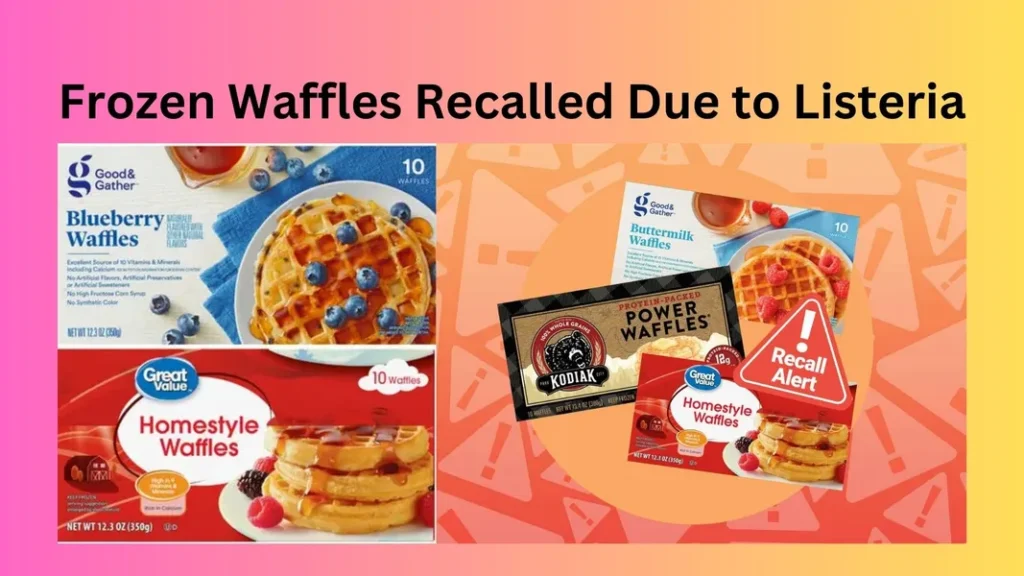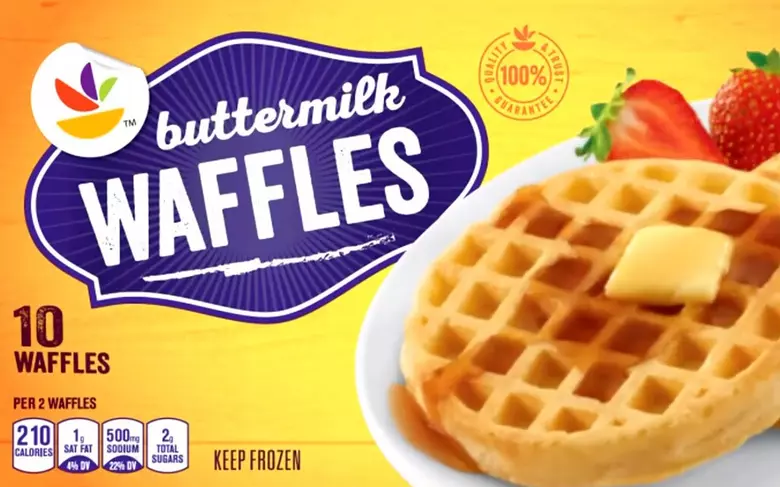Frozen waffles—a staple in many households, especially for those busy mornings when time is tight, and the kids need a quick breakfast fix. They’re simple, convenient, and tasty, right? Well, recently, things took a scary turn when several frozen waffles were recalled due to possible contamination with Listeria. Yikes!

If you’ve heard about this news, you might be wondering, “Wait, what is Listeria, and how can frozen waffles be affected?” or “Are my waffles safe to eat?” Don’t worry, I’ve got you covered. We’ll dive into everything you need to know about this recall, how it affects you, and what you can do to protect yourself and your family.
What Exactly Happened?
Let’s start with the basics. Several batches of frozen waffles from popular brands were recalled recently due to concerns about Listeria monocytogenes, a dangerous bacteria that can cause serious illness. The recall was voluntary, but it still caused panic among consumers. After all, no one wants to imagine that their favorite breakfast treat could potentially make them sick!
Why Are Frozen Waffles Being Recalled?
You might be thinking, “How on earth can frozen waffles get contaminated with bacteria?” It’s a valid question. Listeria is often found in environments where food is processed, such as factories. In this case, it’s believed that the waffles were contaminated during production, possibly from unsanitary equipment or surfaces.
The bacteria can survive in cold temperatures, meaning that even frozen food, which most people consider safe, isn’t always immune. Scary, right? This is why manufacturers act quickly to recall any products they suspect could be contaminated.
What Is Listeria?
So, what is this Listeria we keep talking about? Listeria monocytogenes is a type of bacteria that can lead to an infection called listeriosis. While most people may not even notice symptoms or might experience mild symptoms like fever and diarrhea, it can be life-threatening for specific groups of people, including:
- Pregnant women
- Newborns
- Elderly individuals
- People with weakened immune systems
In severe cases, Listeria can lead to more serious health problems such as meningitis or even death. And that’s why this frozen waffle recall is such a big deal.
How Dangerous Is Listeria?
For the average healthy adult, contracting Listeria might just feel like a bad case of food poisoning. You may experience fever, nausea, muscle aches, or diarrhea. Not pleasant, but something most people can recover from without much trouble.
However, for the groups mentioned earlier—pregnant women, the elderly, newborns, and those with weakened immune systems—the risks are much more serious. Pregnant women, for instance, may suffer miscarriages or stillbirths, even if they don’t feel particularly ill themselves. It’s a bacteria that doesn’t mess around.
Symptoms of Listeriosis: What Should You Watch For?
If you’re worried that you might have consumed contaminated waffles, there are some signs you should look out for. Listeriosis symptoms can vary but commonly include:
- Fever
- Muscle aches
- Nausea
- Diarrhea
In more severe cases, it can escalate to:
- Confusion
- Loss of balance
- Convulsions
- Stiff neck
Symptoms can appear anywhere from a few days to weeks after eating the contaminated product. If you experience any of these symptoms and believe you may have been exposed to Listeria, it’s important to contact a healthcare professional immediately.
What Brands Are Affected?
The recall has affected several well-known brands, but it’s essential to stay updated with the latest information. At the time of this writing, brands such as Brand X and Brand Y are involved in the recall. However, this could change as more testing is conducted, so always double-check with the most current recall alerts to see if your freezer stash is at risk.
How Can I Tell If My Waffles Are Contaminated?
Great question! First off, if you have frozen waffles in your freezer, check the packaging. Look for the lot number and expiration date that matches the recall notice. These will usually be listed on the company’s website or through official food safety organizations like the FDA.
If your package is part of the recall, it’s recommended to throw them away immediately or return them to the store for a refund. And whatever you do, don’t eat them! Even if they look or smell fine, the risk isn’t worth it.
What to Do if You Have Recalled Waffles
If your waffles are part of the recall, the first step is simple—stop eating them! Even if you haven’t experienced any symptoms, it’s better to be safe than sorry.
Here’s a simple step-by-step guide on what you should do:
- Check the lot number on the package.
- Confirm the recall by visiting the company’s or FDA’s website.
- Dispose of the waffles properly—don’t just leave them in the trash where they could potentially contaminate other surfaces.
- Contact the store for a refund or replacement if they offer one.
Can Cooking the Waffles Kill the Bacteria?
One might think, “Can’t I just cook them to kill the bacteria?” Well, theoretically, cooking at high temperatures can kill Listeria. However, it’s tricky because there’s no guarantee that the entire waffle will reach a high enough temperature to eliminate all the bacteria. Additionally, Listeria can survive freezing and grow at refrigerator temperatures. So, to be on the safe side, it’s better to dispose of the recalled products altogether.
How Often Do These Recalls Happen?
Food recalls happen more often than we might realize, especially with processed or pre-packaged goods like frozen waffles. While not all recalls involve Listeria, there are plenty of instances where food products are pulled from shelves due to contamination, mislabeled ingredients, or potential allergens.
Fortunately, food safety organizations are vigilant, and manufacturers typically act quickly when a contamination risk is detected. It might be a hassle, but these recalls are an important part of keeping our food supply safe.
How Can You Protect Yourself from Listeria?
While you can’t always control what happens in food processing plants, you can take steps to minimize your risk of Listeria exposure:
- Keep your fridge clean. Listeria can thrive in cold environments, so regularly clean your refrigerator, especially any areas where raw food is stored.
- Store food properly. Make sure your fridge is at or below 40°F (4°C).
- Cook food thoroughly. Heat kills Listeria, so cooking foods to the appropriate temperatures can help reduce the risk.
- Be mindful of expiration dates. Always check expiration dates and avoid consuming foods past their “best by” dates.
- Wash fruits and vegetables. Even though Listeria primarily affects animal products, fresh produce can still be a source of contamination.

How Are Companies Preventing Future Contaminations?
The good news is that food manufacturers take these recalls seriously. Most companies will halt production and initiate cleaning protocols to ensure that the issue is resolved. Food safety standards are tightened, and many brands work closely with health organizations to ensure the contamination source is identified and eliminated.
For consumers, it’s reassuring to know that these precautions are taken to prevent future incidents. But it’s also a reminder to stay informed about food recalls.
What Can I Do if I Have More Questions?
If you’re unsure about whether your waffles are affected or have more questions, the best thing to do is to contact the brand or the retailer where you purchased the product. Additionally, government websites like the FDA’s recall page or the USDA will have up-to-date information on any ongoing recalls. These resources are valuable tools to keep you informed and safe.
Conclusion
In the end, while this frozen waffle recall due to Listeria might seem alarming, it’s a good reminder of how important food safety is. By staying informed and taking the proper precautions, you can protect yourself and your family from potential harm. Keep an eye on recalls, check your packages, and when in doubt, it’s always better to toss the product than risk your health.
FAQs
1. How do I know if my frozen waffles are part of the recall?
Check the lot number and expiration date on the package. Compare it to the recall information provided by the brand or the FDA website.
2. Can Listeria survive in frozen foods?
Yes, Listeria can survive in cold environments, including frozen foods, which is why the recall is so important.
3. What should I do if I think I ate contaminated waffles?
Monitor for symptoms like fever, nausea, and muscle aches. If you experience severe symptoms or fall into a high-risk group, contact your doctor.
4. Can cooking the waffles kill Listeria?
While cooking may kill some bacteria, it’s not guaranteed to eliminate all Listeria in frozen waffles, so it’s best not to risk it.
5. Are other frozen breakfast products affected by this recall?
As of now, only certain frozen waffle brands have been recalled. However, always stay updated by checking food recall alerts for other potential risks.